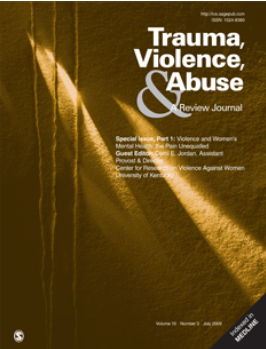遭受亲密伴侣暴力的LGBTIQA+个体获得和提供初级保健服务的障碍:范围审查
IF 5.4
1区 社会学
Q1 CRIMINOLOGY & PENOLOGY
引用次数: 0
摘要
LGBTIQA+个体遭受亲密伴侣暴力(IPV)的频率高于非LGBTIQA+个体,但寻求帮助的比例较低,而且从初级保健提供者那里获得的护理往往不足。这项范围审查确定了LGBTIQA+经历IPV的人获得和提供初级保健服务的障碍。审查是按照乔安娜布里格斯研究所的范围审查方法进行的。在三个数据库(ProQuest、MEDLINE和CINAHL)中检索了经济合作与发展组织在2024年10月之前发表的同行评议文献。灰色文献是通过谷歌和谷歌学者检索确定的。人工搜索相关评审的参考文献列表,以确定符合纳入标准的记录。共识别了5,439条记录。在删除重复和应用纳入标准后,保留了19份出版物供分析。研究结果表明,经历IPV的LGBTIQA+个体在获得初级保健方面面临障碍,包括难以识别IPV,害怕歧视,以及提供者培训不足和非包容性服务等系统性不平等。初级保健提供者报告了服务中的异规范假设,缺乏LGBTIQA+特定培训,以及机构对包容性护理的抵制。这些发现强调了有针对性的干预措施的必要性,这些干预措施既鼓励LGBTIQA+个体寻求与ipvv相关的初级保健支持,又为提供者提供必要的培训和资源,以提供具有文化能力的护理,同时也要解决使初级保健服务提供中的系统性不平等长期存在的无性别和异性恋规范假设。本文章由计算机程序翻译,如有差异,请以英文原文为准。
Barriers to Accessing and Providing Primary Care Services for LGBTIQA+ Individuals Experiencing Intimate Partner Violence: A Scoping Review
LGBTIQA+ individuals experience intimate partner violence (IPV) more frequently than non-LGBTIQA+ individuals but seek help at lower rates and frequently receive inadequate care from primary care providers. This scoping review identified barriers to accessing and providing primary care services for LGBTIQA+ people experiencing IPV. The review was conducted in accordance with the Joanna Briggs Institute methodology for scoping reviews. Three databases (ProQuest, MEDLINE, and CINAHL) were searched for peer-reviewed literature published in the Organization for Economic Co-operation and Development in the last 20 years before October 2024. Gray literature was identified through a Google and Google Scholar search. Reference lists from relevant reviews were manually searched to identify records that met the inclusion criteria. A total of 5,439 records were identified. After de-duplication and applying inclusion criteria, 19 publications were retained for analysis. Findings indicate that LGBTIQA+ individuals experiencing IPV face barriers to accessing primary care, including difficulty recognizing IPV, fear of discrimination, and systemic inequities such as inadequate provider training and non-inclusive services. Primary care providers report heteronormative assumptions in services, lack of LGBTIQA+ specific training, and institutional resistance to inclusive care. These findings highlight the need for targeted interventions that both encourage LGBTIQA+ individuals to seek IPV-related primary care support and equip providers with the training and resources necessary to deliver culturally competent care, while also addressing the cisgender and heteronormative assumptions that perpetuate systemic inequities in primary care service provision.
求助全文
通过发布文献求助,成功后即可免费获取论文全文。
去求助
来源期刊

Trauma Violence & Abuse
Multiple-
CiteScore
13.60
自引率
7.80%
发文量
131
期刊介绍:
Trauma, Violence, & Abuse is devoted to organizing, synthesizing, and expanding knowledge on all force of trauma, abuse, and violence. This peer-reviewed journal is practitioner oriented and will publish only reviews of research, conceptual or theoretical articles, and law review articles. Trauma, Violence, & Abuse is dedicated to professionals and advanced students in clinical training who work with any form of trauma, abuse, and violence. It is intended to compile knowledge that clearly affects practice, policy, and research.
 求助内容:
求助内容: 应助结果提醒方式:
应助结果提醒方式:


